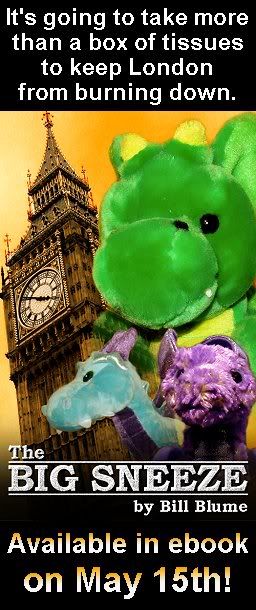When it comes to reading, most consider it bad form to find out the ending before you’ve actually read the book. Not so when it comes to writing. At least, that’s the advice I learned last month from two of the thriller genre’s best-selling writers.

 Every month in Richmond, James River Writers holds “The Writing Show” at the Science Museum of Virginia. This odd mix of talk show and “Inside the Actors Studio” brings in talent from all corners of the literary world. We’ve seen many agents, editors and writers pay our city a visit. Last month, thriller writers Brian Haig and Steve Berry came to “The Writing Show” to discuss how they build their thriller novels.
Every month in Richmond, James River Writers holds “The Writing Show” at the Science Museum of Virginia. This odd mix of talk show and “Inside the Actors Studio” brings in talent from all corners of the literary world. We’ve seen many agents, editors and writers pay our city a visit. Last month, thriller writers Brian Haig and Steve Berry came to “The Writing Show” to discuss how they build their thriller novels.Brian specializes in military thrillers where as Berry tends to write history-based thrillers. As their style of thrillers differ, so did much of their advice. They provided a friendly counterpoint, and while I could easily focus on all the ways in which they disagreed, I think it far more interesting to look at one thing on which they did agree. Both Brian and Steve said that to write a tight thriller novel, the writer needs to know how it’s all going to end. They both pointed out that knowing how it all ends makes it that much easier to realize what isn’t important to the story. As a writer, you’re less likely to waste time on a “cute” scene that doesn’t really add anything.
While my specialty is writing fantasy, I found their discussion on thriller novel construction very useful. Perhaps the most interesting thing for me was that they confirmed something I’d suspected about one of the novels I’m writing. For some time, I’ve considered my solo work The Cold Shoulder a thriller novel disguised as a fantasy novel. The things Brian and Steve said about writing thrillers confirmed that for me.

I don’t really know how The Cold Shoulder will end, though. Heck, I’m still trying to figure out all of the villains. Brian and Steve made me appreciate how important the ending really is to building a good thriller, and I will be able to use that advice to make The Cold Shoulder a well-written story. I probably won’t know my ending until I get there, but when it comes time to edit, you can bet I’ll be approaching that task with a firm idea of how everything ties into the end.
I have to say that this particular “Writing Show” was one of the best we’ve had. Hopefully, I can draw on that particular show for a few more blog entries. Both Brian and Steve offered so much useful advice.













2 comments:
there was a bit of a discussion on something like this over at that blog address i gave you.. basically it was to find out if you should outline your book (along with an ending) Or let the writing flow free... I think it came down to "whatever works for you".. but if "going with the flow" wasn't working well that outlining is not a bad thing to do!
There's a plotting method called 'distant shores' where you know how things will end, but don't completely know how you'll get there. Like crossing a river, you might go a bit further downstream than you originally thought.
Someone once said to me that the ending sold the next book, so it's very important.
Post a Comment